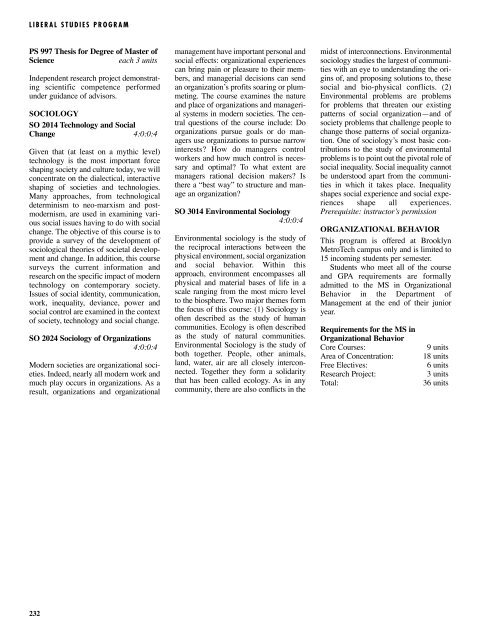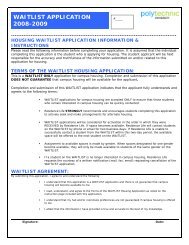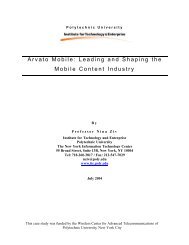POLYTECHNIC UNIVERSITY 2005-2007
POLYTECHNIC UNIVERSITY 2005-2007
POLYTECHNIC UNIVERSITY 2005-2007
You also want an ePaper? Increase the reach of your titles
YUMPU automatically turns print PDFs into web optimized ePapers that Google loves.
LIBERAL STUDIES PROGRAM<br />
PS 997 Thesis for Degree of Master of<br />
Science<br />
each 3 units<br />
Independent research project demonstrating<br />
scientific competence performed<br />
under guidance of advisors.<br />
SOCIOLOGY<br />
SO 2014 Technology and Social<br />
Change 4:0:0:4<br />
Given that (at least on a mythic level)<br />
technology is the most important force<br />
shaping society and culture today, we will<br />
concentrate on the dialectical, interactive<br />
shaping of societies and technologies.<br />
Many approaches, from technological<br />
determinism to neo-marxism and postmodernism,<br />
are used in examining various<br />
social issues having to do with social<br />
change. The objective of this course is to<br />
provide a survey of the development of<br />
sociological theories of societal development<br />
and change. In addition, this course<br />
surveys the current information and<br />
research on the specific impact of modern<br />
technology on contemporary society.<br />
Issues of social identity, communication,<br />
work, inequality, deviance, power and<br />
social control are examined in the context<br />
of society, technology and social change.<br />
SO 2024 Sociology of Organizations<br />
4:0:0:4<br />
Modern societies are organizational societies.<br />
Indeed, nearly all modern work and<br />
much play occurs in organizations. As a<br />
result, organizations and organizational<br />
management have important personal and<br />
social effects: organizational experiences<br />
can bring pain or pleasure to their members,<br />
and managerial decisions can send<br />
an organization’s profits soaring or plummeting.<br />
The course examines the nature<br />
and place of organizations and managerial<br />
systems in modern societies. The central<br />
questions of the course include: Do<br />
organizations pursue goals or do managers<br />
use organizations to pursue narrow<br />
interests? How do managers control<br />
workers and how much control is necessary<br />
and optimal? To what extent are<br />
managers rational decision makers? Is<br />
there a “best way” to structure and manage<br />
an organization?<br />
SO 3014 Environmental Sociology<br />
4:0:0:4<br />
Environmental sociology is the study of<br />
the reciprocal interactions between the<br />
physical environment, social organization<br />
and social behavior. Within this<br />
approach, environment encompasses all<br />
physical and material bases of life in a<br />
scale ranging from the most micro level<br />
to the biosphere. Two major themes form<br />
the focus of this course: (1) Sociology is<br />
often described as the study of human<br />
communities. Ecology is often described<br />
as the study of natural communities.<br />
Environmental Sociology is the study of<br />
both together. People, other animals,<br />
land, water, air are all closely interconnected.<br />
Together they form a solidarity<br />
that has been called ecology. As in any<br />
community, there are also conflicts in the<br />
midst of interconnections. Environmental<br />
sociology studies the largest of communities<br />
with an eye to understanding the origins<br />
of, and proposing solutions to, these<br />
social and bio-physical conflicts. (2)<br />
Environmental problems are problems<br />
for problems that threaten our existing<br />
patterns of social organization—and of<br />
society problems that challenge people to<br />
change those patterns of social organization.<br />
One of sociology’s most basic contributions<br />
to the study of environmental<br />
problems is to point out the pivotal role of<br />
social inequality. Social inequality cannot<br />
be understood apart from the communities<br />
in which it takes place. Inequality<br />
shapes social experience and social experiences<br />
shape all experiences.<br />
Prerequisite: instructor’s permission<br />
ORGANIZATIONAL BEHAVIOR<br />
This program is offered at Brooklyn<br />
MetroTech campus only and is limited to<br />
15 incoming students per semester.<br />
Students who meet all of the course<br />
and GPA requirements are formally<br />
admitted to the MS in Organizational<br />
Behavior in the Department of<br />
Management at the end of their junior<br />
year.<br />
Requirements for the MS in<br />
Organizational Behavior<br />
Core Courses:<br />
Area of Concentration:<br />
Free Electives:<br />
Research Project:<br />
Total:<br />
9 units<br />
18 units<br />
6 units<br />
3 units<br />
36 units<br />
232




